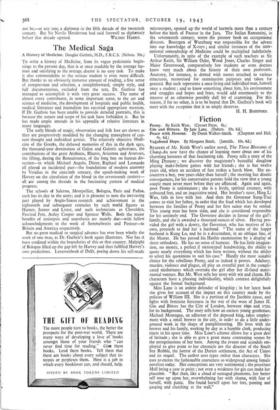The Medical Saga
A History of Medicine. Douglas Guthrie, M.D., F.R.C.S. (Nelson. 30s.)
To write a history of Medicine, from its vague prehistoric begin- nings to the present day, that is at once readable by the average lay- man and satisfying to the average, doctor is no easy task. To make it also commendable to the serious student is even more difficult. But thanks to an obviously immense amount of reading, a fine sense of compression and selection, a straightforward, simple style, and full documentation, excluded from the text, Dr. Guthrie has managed to accomplish it with very great success. The name of almost every contributor, in some important sense, to the art and science of medicine, the development of hospitals and public health, medical literature and journalism has received appropriate mention. If Dr. Guthrie has been unable to provide detailed portraits, this is because the nature and scope of his task have forbidden it. But he has made ample amends in his appendix of relative literature in many languages.
The early blends of magic, observation and folk lore are shown as they are progressively modified by the changing atmosphere of cur- rent thought and individual genius. The relatively objective Medi- cine of the Greeks, the debased memories of this in the dark ages, the thousand-year domination of Galen and Galenic aphorisms, the contributions of the great Arabians, Rhazes, Avicenna and Averroes, the lifting, during the Rennaissance, of the long ban on human dis- section—in which Michael Angelo, Dilrer, Raphael and Leonardo all played an incidental part—the foundations of modern anatomy by Vesalius in the sixteenth century, the epoch-making work of Harvey on the circulation of the blood in the seventeenth century— all are among the threads in the fascinating pattern of medical progress.
The schools of Salerno, Montpellier, Bologna, Paris and Padua, each has its day in the story; and it is pleasant to note the increasing part played by Anglo-Saxon research and achievement in the eighteenth and subsequent centuries by such world figures as Hunter, Jenner and Lister, and such technicians as Cheselden, Percival Pott, Astley Cooper and Spencer Wells. Both the major benefits of antisepsis and anwsthesia are mainly due—with fullest acknowledgments to the work of Semmelweiss and Pasteur—to Britain and America respectively.
But no great medical or surgical advance has ever been wholly the work of one man, as Dr. Guthrie's book again illustrates. Nor has it been confined within the boundaries of this or that country. Malpighi of Bologna filled up the gap left by Harvey and thus fulfilled Harvey's own predictions. Leeuwenhoek of Delft, poring down his self-made microscopes, opened up the world of bacteria more than a century before the birth of Pasteur in the Jura. The Italian Ramazzini, in the seventeenth century, wrote the pioneer book on occupational diseases. Roentgen of Wurzburg was responsible for the advent into our knowledge of X-rays ; and similar instances of the inter- national comradeship of Medicine could be multiplied indefinitely.
Unfortunately, in spite of the example of such teachers as Sir Arthur Keith, Sir William Osler, Wood Jones, Charles Singer and Major Greenwood, comparatively few students or even doctors know very much about the history of their own profession. Anatomy, for instance, is dotted with names attached to various structures, memorised for examination purposes and taken for granted. But each represents a once living and individual man, himself once a student ; and to know something about him, his environment and struggles and hopes and fears, would add enormously to the interest of an otherwise possibly dull bit of cramming. For this reason, if for no other, it is to be hoped that Dr. Guthrie's book will meet with the reception that it so amply deserves.
H. H. BASHFORD.


























 Previous page
Previous page